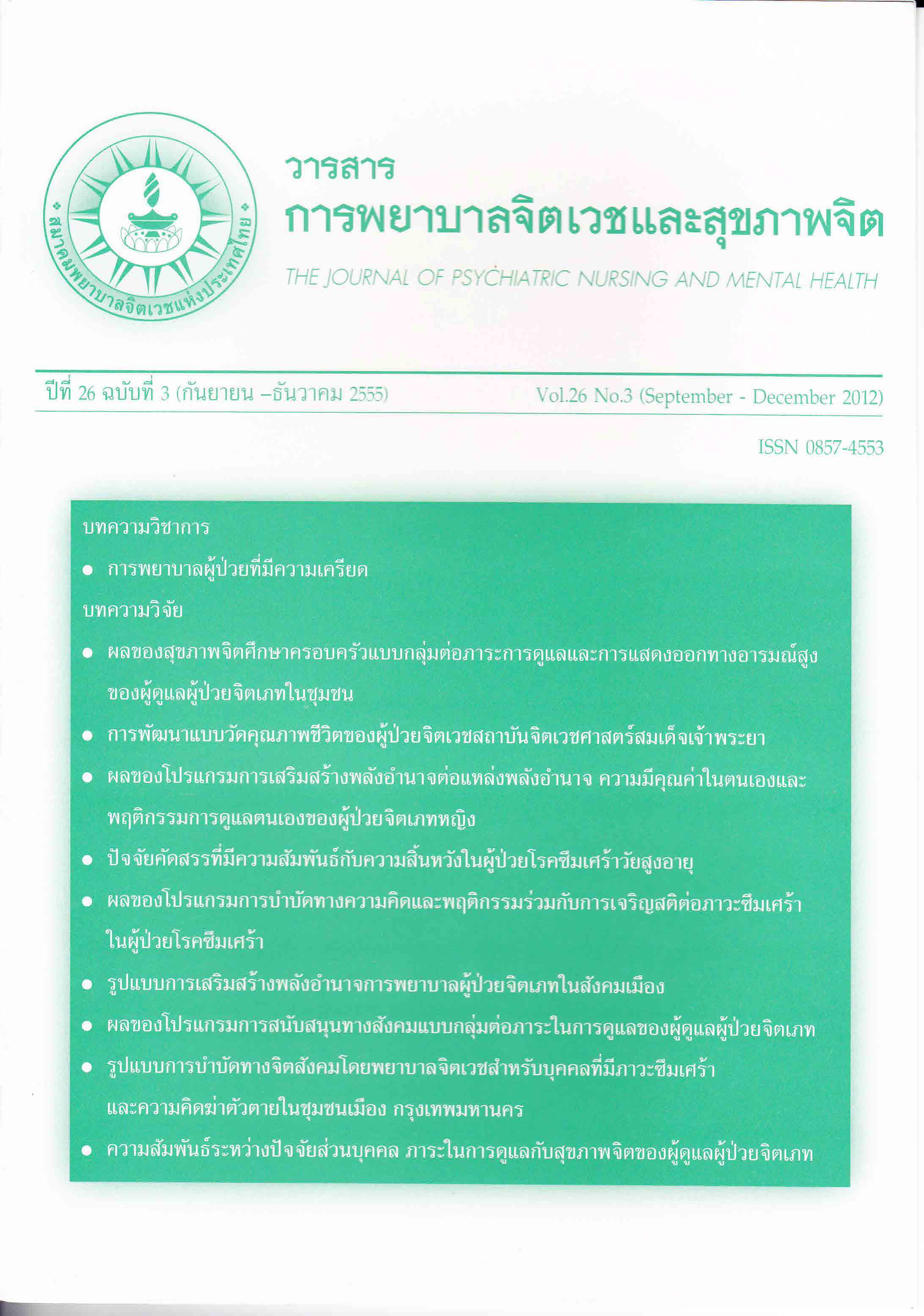ผลของโปรแกรมการสนับสนุนทางสังคมแบบกลุ่ม ต่อภาระในการดูแลของผู้ดูแลผู้ป่วยจิตเภท
Main Article Content
บทคัดย่อ
บทคัดย่อ
การวิจัยกึ่งทดลองแบบสองกลุ่มวัดสองครั้งก่อนและหลังการทดลองเรื่องนี้ มีวัตถุประสงค์เพื่อ1) เปรียบเทียบภาระการดูแลของผู้ดูแลผู้ป่วยจิตเภทก่อนและหลังได้รับโปรแกรมการสนับสนุนทางสังคมแบบกลุ่ม 2) เปรียบเทียบภาระการดูแลของผู้ดูแลผู้ป่วยจิตเภทระหว่างกลุ่มที่ได้รับโปรแกรมการสนับสนุนทางสังคมแบบกลุ่มกับกลุ่มที่ได้รับการพยาบาลตามปกติ กลุ่มตัวอย่างคือ ผู้ดูแลผู้ป่วยจิตเภทที่พาผู้ป่วยมารับบริการที่แผนกจิตเวช โรงพยาบาลท่าเรือซึ่งมีคุณสมบัติครบตามเกณฑ์ จำนวน 40 คน จับคู่สุ่มเข้ากลุ่มทดลองและกลุ่มควบคุม กลุ่มละ 20 คน กลุ่มทดลองได้รับการดูแลตามโปรแกรมการสนับสนุนทางสังคมแบบกลุ่มที่ผู้วิจัยสร้างขึ้น ประกอบด้วยการดำเนินกลุ่ม 6 ครั้ง เพื่อพัฒนาทักษะที่เกี่ยวข้องได้แก่ การสร้างสัมพันธภาพ การผ่อนคลาย การเผชิญความเครียดอย่างมีประสิทธิภาพ การฝึกทักษะในการแก้ปัญหา การให้ความรู้ การเข้าถึงแหล่งทรัพยากร ส่วนกลุ่มควบคุมได้รับการพยาบาลตามปกติ เครื่องมือที่ใช้ในการวิจัย คือโปรแกรมการสนับสนุนทางสังคมแบบกลุ่ม แบบวัดภาระการดูแล และแบบวัดการสนับสนุนทางสังคม ซึ่งผ่านการตรวจสอบความตรงเชิงเนื้อหาจากผู้ทรงคุณวุฒิ จำนวน 5 ท่าน โดยแบบวัดภาระการดูแล และแบบวัดการสนับสนุนทางสังคมมีค่าความเที่ยงสัมประสิทธิ์อัลฟาของครอนบาคเท่ากับ 0.84 และ 0.83 ตามลำดับ วิเคราะห์ข้อมูลโดยใช้สถิติทดสอบที (t-test) ผลการวิจัยที่สำคัญสรุปได้ดังนี้
1. ภาระการดูแลของผู้ดูแลผู้ป่วยจิตเภทหลังได้รับโปรแกรมการสนับสนุนทางสังคมแบบกลุ่มต่ำกว่าก่อนการได้รับโปรแกรมการสนับสนุนทางสังคมแบบกลุ่มอย่างมีนัยสำคัญทางสถิติที่ระดับ .05
2. ภาระการดูแลของผู้ดูแลผู้ป่วยจิตเภทกลุ่มที่ได้รับโปรแกรมการสนับสนุนทางสังคมแบบกลุ่มต่ำกว่ากลุ่มที่ได้รับการดูแลตามปกติอย่างมีนัยสำคัญทางสถิติที่ระดับ .05
คำสำคัญ : ผู้ป่วยจิตเภท, ภาระการดูแล, การสนับสนุนทางสังคม, โปรแกรมการสนับสนุนทางสังคม, แบบกลุ่ม
Abstract
The purpose of this quasi-experimental research using the pretest-posttest design were: 1) to compare the burden of caregiver of schizophrenic patients before and after received the social support group program, and 2) to compare the burden of caregiver of schizophrenic patients who received social support group program and those who received regular nursing care. Forty of caregiver of schizophrenic patients receiving services in mental department, Tharea Hospital, who met the inclusion criteria were matched pair and then randomly assigned to experimental group and control group, 20 subjects in each group. The experimental group received the social support group program composed of 6 group activities to improve relevant skills including the relationship, relaxation, confronting tension efficiently, problem solving skills, education, appreciate resource place. The control group received regular nursing care. Research instruments were the social support group program, caregiver burden scale, and social support scale which were developed by the researcher. These instruments were tested for content validity by a panel of 5 experts. The reliability of caregiver burden scale and social support scale were reported using Chronbach’s Alpha coefficient as of 0.84 and 0.83 respectively. The t-test was used in data analysis. Major findings were as follows:
1. Burden of caregivers of schizophrenic patients who received the social support group program after the experiment was significantly lower than before experiment at the .05 level.
2. Burden of caregivers of schizophrenic patients who received the social support group program was significantly lower than those caregivers who received in regular nursing care at the .05 level.
Keywords : Schizophrenic Patients, Burden, Social Support, Social Support Group Program
Article Details
บทความที่ได้รับการตีพิมพ์แล้ว เป็นลิขสิทธิ์ของสมาคมพยาบาลจิตเวชแห่งประเทศไทย


